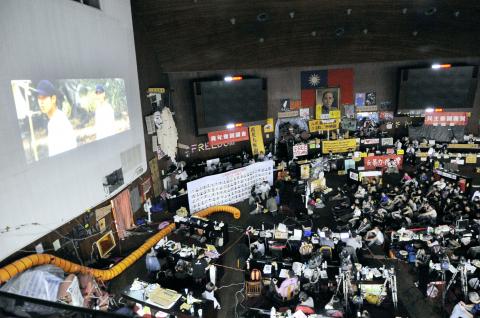Lights were dimmed to turn the occupied legislative chamber into a movie theater on Monday night, as the blockbuster Taiwanese film Kano was screened for the assembled students and media corps inside for an evening of entertainment.
The screening was a treat for the Sunflower movement protesters holed up inside the legislature, and was arranged with the approval of Wei Te-sheng (魏德聖), executive producer of the baseball movie set in the 1930s.
Kano, whose domestic box office receipts have already surpassed NT$250 million (US$8.23 million), is based on the true story of a high-school baseball team from Chiayi City overcoming the odds to reach the 1931 final of Japan’s prestigious Koshien high-school baseball championship, held annually in Osaka.

Photo: Chen Chih-chu, Taipei Times
It has made history by becoming the first full-length feature film on the commercial circuit given a screening inside the legislature.
Wei, Taiwan’s leading movie director and producer, threw his support behind the Sunflower movement, while the students, who were into the 14th day of their siege of the legislature, said watching Kano was a much-needed respite and morale booster for them.
A spokesperson for Wei’s ARS Film Production Co said: “The students initiated contact with us. We decided to give the go-ahead for the movie screening inside the legislature. It was our way of showing support, because we understood that many students were worn out mentally and physically after what they went through in the past weeks.”
The screening began at 8:30pm on Monday evening, with several hundred students and media representatives on hand to watch the three-hour-long feature film.
After the rally in Taipei on Sunday, Wei was moved to write a letter to the students, which was read aloud for the audience inside the legislature before the screening.
In the letter, Wei lauded the courage of the students in their action “in defense of our democracy.”
He also asked: “For the cross-strait service trade pact, can we not go back and restart the negotiations from the beginning?”
“That night, when students broke down the doors to the legislature, I felt such shock and intense emotions as I had never experienced before. It was not the use of force by students, but because my heart deeply felt it was the start of an awakening movement of people defending Taiwan,” Wei wrote.
“The government should not ask the students when the protest will end, but should ask them to help solve problems,” he added.
“I truly wish that in future years I can still listen to songs and music belonging to Taiwan, to tell stories about Taiwan and to smell the aroma from the land of Taiwan,” Wei wrote at the end of the letter.
“I want to thank this group of students who are defending Taiwan’s democracy. It is because of them that I have seen the beauty and goodness of Taiwan,” Wei said.

The Ministry of Economic Affairs has fined Taobao NT$1.2 million (US$36,912) for advertisements that exceed its approved business scope, requiring the Chinese e-commerce platform to make corrections in the first half of this year or its license may be revoked. Lawmakers have called for stricter enforcement of Chinese e-commerce platforms and measures to prevent China from laundering its goods through Taiwan in response to US President Donald Trump’s heavy tariffs on China. The Legislative Yuan’s Finance Committee met today to discuss policies to prevent China from dumping goods in Taiwan, inviting government agencies to report. Democratic Progressive Party Legislator Kuo Kuo-wen (郭國文) said

The Ministry of Economic Affairs has fined Taobao NT$1.2 million (US$36,900) for advertisements that exceeded its approved business scope and ordered the Chinese e-commerce platform to make corrections in the first half of this year or its license would be revoked. Lawmakers have called for stricter supervision of Chinese e-commerce platforms and more stringent measures to prevent China from laundering its goods through Taiwan as US President Donald Trump’s administration cracks down on origin laundering. The legislature’s Finance Committee yesterday met to discuss policies to prevent China from dumping goods in Taiwan, inviting government agencies to report on the matter. Democratic Progressive Party

Taiwan and its Pacific ally Tuvalu on Tuesday signed two accords aimed at facilitating bilateral cooperation on labor affairs, according to Taiwan’s Ministry of Foreign Affairs (MOFA). The governments inked two agreements in Taipei, witnessed by Foreign Minister Lin Chia-lung (林佳龍) and visiting Deputy Tuvaluan Prime Minister Panapasi Nelesone, MOFA said in a news release. According to MOFA, the agreements will facilitate cooperation on labor issues and allow the two sides to mutually recognize seafarers’ certificates and related training. Taiwan would also continue to collaborate with Tuvalu across various fields to promote economic prosperity as well as the well-being of their

Sung Chien-liang (宋建樑), who led efforts to recall Democratic Progressive Party (DPP) Legislator Lee Kun-cheng (李坤城), was released on bail of NT$80,000 today amid outcry over his decision to wear a Nazi armband to questioning the night before. Sung arrived at the New Taipei District Prosecutors’ Office for questioning in a recall petition forgery case last night wearing a red armband bearing a swastika, carrying a copy of Adolf Hitler’s Mein Kampf and giving a Nazi salute. Sung left the building at 1:15am without the armband and covering the book with his coat. Lee said today that this is a serious